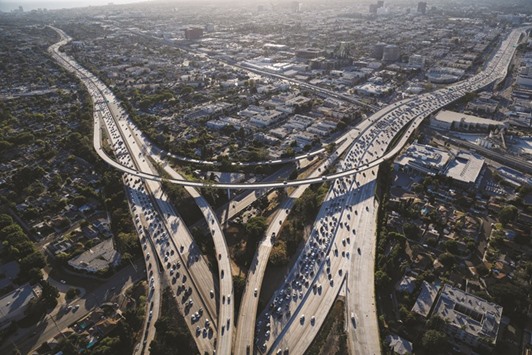Pressure weighing on the global auto industry for more than a year finally appeared to ease on Wednesday as Volkswagen agreed to $4.3bn in fines for cheating on emissions tests, largely putting the scandal to rest. Less than a day later, the outlook darkened again as Renault and Fiat Chrysler Automobiles were hit with similar allegations of violating clean-air regulations.
Paris prosecutors, who raided Renault a year ago in an initial emissions investigation, opened a probe into the automaker on Thursday. About the same time, the US Environmental Protection Agency accused Fiat Chrysler of installing software in 104,000 Jeep Grand Cherokees and Ram 1500 pickups that allowed them to exceed pollution limits on the road. The Justice Department also is investigating Fiat Chrysler over its diesel emissions, according to people familiar with the matter, Bloomberg reported on Friday.
Both companies denied using software like Volkswagen’s, which was designed to lower emissions to legal limits when it senses the car is being tested and then easing pollution controls on the road to improve performance. Nonetheless, the prospect of a fight with authorities sent shares of the two automakers tumbling.
Fiat fell 16% on Thursday before clawing back some of those losses on Friday after chief executive officer Sergio Marchionne called the allegations “unadulterated hogwash.” Renault lost as much as 6% in Paris trading on Friday morning, its sharpest drop since June, after word of the probe filtered out. The shares finished the day down 3.2%.
Since Volkswagen’s cheating surfaced in September 2015, concern over emissions has shadowed manufacturers across the industry. Mitsubishi Motors Corp was sent reeling from revelations it had improperly tested fuel-economy for decades. Germany forced automakers to recall 630,000 cars to upgrade emissions systems that stretched the boundaries of regulation. Daimler was sued by some US owners of Mercedes-Benz cars over claims the company misled consumers about their environmental impact.
While that case was dismissed in December, it shows the intensity of the scrutiny that automakers face. More stringent oversight serves as something of a double blow as the industry must ramp up investment into cleaner cars to meet stiffer guidelines for the future, even as consumers show scant interest in thrifty vehicles.
Volkswagen’s bill for its cheating rose to about €20.5bn ($21.9bn) last week after the company settled criminal and civil complaints with the US Department of Justice, including pleading guilty to conspiracy to defraud the government and obstruction of justice. While there’s no evidence that other manufacturers have also deliberately cheated on emissions tests, it’s typical for cars to pollute more on the road than during tests – which opens the door to a lot of massaging performance.
“There will be many more probes,” said Matthias Holweg, a management professor at Oxford University’s Said Business School. “The scope for manipulation is very present for every car company.”
Renault, whose biggest shareholder is the French government with a 20% stake, says it hasn’t received any official notification about the latest developments in the probe, which French prosecutors announced in a brief statement on Friday. The company insists its vehicles comply with French and European Union legislation and aren’t equipped with software to cheat on emissions.
Renault shares tumbled last January after a report that government investigators had searched the company. Then in April, the premises of crosstown rival PSA Group, the maker of Peugeot and Citroen, were also raided as part of an emissions-related probe. In November, French fraud watchdogs said their research found enough material to require further investigation into nitrogen oxides emitted by the company’s vehicles.
The allegations against Fiat, which may result in penalties as high as $4.6bn, were the latest blow from Washington, where safety regulators are probing reports that its SUVs can roll away after drivers park them. The US Justice Department and Securities and Exchange Commission are also said to be investigating Fiat Chrysler’s sales-reporting practices, and Germany has raised concerns about the company’s emissions in Europe.
Fiat Chrysler breached pollution laws with the diesel-powered Ram pickups and Jeep SUVs because it failed to disclose emission-control devices that “no doubt” contributed to pollution, according to Cynthia Giles, the EPA’s enforcement chief.
While automakers don’t deny there are discrepancies in their emissions readings, they point to fuzzy regulations that allow carmakers to adjust exhaust systems to protect the engine. While the parameters can be murky, that doesn’t mean the manufacturers are cheats, according to Fiat CEO Marchionne. He insists his company did nothing wrong and any insinuation that it’s behaving like Volkswagen did is “absolute nonsense.”

Vehicles move in rush hour traffic between the Interstate 405 and 10 freeways in this aerial photograph taken over Los Angeles, California, US (file). Pressure weighing on the global auto industry for more than a year finally appeared to ease on Wednesday as Volkswagen agreed to $4.3bn in fines for cheating on emissions tests, largely putting the scandal to rest. Less than a day later, the outlook darkened again as Renault and Fiat Chrysler Automobiles were hit with similar allegations of violating clean-air regulations.
